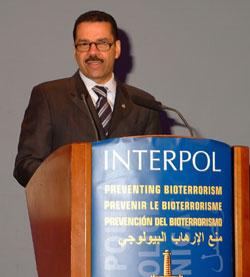
The Celtic League has urged the International Criminal Police Organisation, Interpol, not to allow itself to be used as a tool to facilitate Spain's political suppression of the Basques.
The League has said that Interpol involvement in seeking the return to Spain of a recently released former member of ETA was of concern as the allegations against him were 'questionable' in terms of International human rights law (see below):
Ronald K. Noble Secretary General Interpol
General Secretariat
200, quai Charles de Gaulle
69006 Lyon
France
29 September 2008
Dear Ronald K. Noble
Inaki de Juana Chaos
I am writing to you following the news that the Spanish Government has asked Interpol for assistance in apprehending Inaki de Juana Chaos, who was released from prison in August 2008, after serving 21 years for murder and other crimes.
Spanish Judge, Eloy Velasco, contacted Interpol in Madrid to contact Interpol Dublin, Ireland, which is where Juana Chaos is currently believed to be for his alleged crime of writing a letter from prison in which he expressed opinions that breached the Spanish law of 'making an apology for terrorism'.
As you may be aware, Spain is due to give evidence to the United Nations Human Rights Committee on 21st and 22nd October 2008 for its failure to meet obligations under the International Covenant on Civil and Political Rights. Among the specific concerns that will be raised by the Committee, is Spain's "numerous violations of the freedom of expression, on grounds of fear of terrorism" and the Spanish delegation will be asked "to what extent can the State party justify violations of the freedom of opinion and expression in the Basque Country?" (Article 19 of the Covenant).
As you will be able to appreciate, the Spanish Government's record on freedom of expression, especially in political matters relating the Basque Country, is suspected of being repressive by the international community.
Some years ago, the Celtic League was informed by yourself that:
— Interpol is not a political tool of member governments and is governed by a Constitution - Article three of which states: It is strictly forbidden for the Organization to undertake any intervention or activities of a political, military, religious or racial character.
The League was also told by Rutsel Martha, General Counsel Office of Legal Affairs for Interpol, that:
– In addition whenever an individual alleges the political character of his case, the General Secretariat conducts simultaneously an exchange of views with the NCB concerned and controls the information contained in its database with a view to assessing whether or not that NCB had "undertake(n) any intervention or activit(y) of a political (....) character", which would be "strictly forbidden" under Article 3 of Interpol's Constitution. Rest assured that Interpol remains deeply committed to ensuring the respect of its Constitution.
With the above comments in mind and in view of the fact that Spain will be presenting evidence in its own defence in October to the United Nations on punishable crimes in the Spanish state that are rather questionable, would it not be better to use discretion in the de Juana Chaos case for the time being, based on the possibility that de Juana Chaos' summons may be politically motivated?
We look forward to hearing from you with your thought on this matter.
Rhisiart Tal-e-bot, General Secretary
Related articles on Celtic News at:
J B Moffatt Director of Information Celtic League 01/10/08
 The Celtic League has branches in the six Celtic Countries. It works to promote cooperation between these countries and campaigns on a broad range of political, cultural and environmental matters. It highlights human rights abuse, monitors all military activity and focuses on socio-economic issues.
TEL (UK) 01624 877918
MOBILE (UK)07624 491609
(voir le site)
The Celtic League has branches in the six Celtic Countries. It works to promote cooperation between these countries and campaigns on a broad range of political, cultural and environmental matters. It highlights human rights abuse, monitors all military activity and focuses on socio-economic issues.
TEL (UK) 01624 877918
MOBILE (UK)07624 491609
(voir le site)